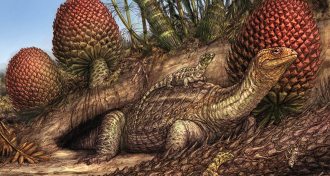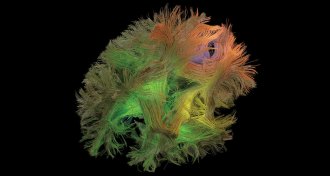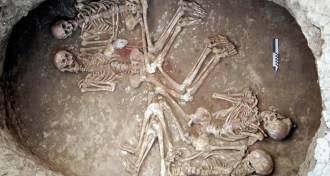Humans
Sign up for our newsletter
We summarize the week's scientific breakthroughs every Thursday.
-
 Animals
AnimalsA rare, ancient case of bone cancer has been found in a turtle ancestor
A 240-million-year-old fossil reveals the oldest known case of bone cancer in an amniote, a group that includes mammals, birds and reptiles.
-
 Neuroscience
NeuroscienceBrain discoveries open doors to new treatments
Editor in Chief Nancy Shute discusses the history of neuroscience and new techniques scientists are using to influence the brain.
By Nancy Shute -
 Health & Medicine
Health & MedicineBrain-zapping implants that fight depression are inching closer to reality
Researchers are using electric jolts to correct the faulty brain activity that sparks depression.
-
 Genetics
GeneticsDNA reveals early mating between Asian herders and European farmers
A new genetic analysis could upend assumptions about the origins of Indo-European languages.
By Bruce Bower -
 Health & Medicine
Health & MedicineIn some cases, getting dengue may protect against Zika
A Zika outbreak in a Brazilian slum suggests that the timing of dengue infections may matter for protection against Zika.
-
 Health & Medicine
Health & MedicinePills equipped with tiny needles can inject a body from the inside
High-tech pills equipped with medicinal needles could administer painless shots inside the body.
-
 Life
LifeEvolutionarily, grandmas are good for grandkids — up to a point
Women may live past their reproductive years because they help their grandchildren survive, but there are limits to that benefit.
By Sujata Gupta -
 Health & Medicine
Health & MedicineIn the third trimester, a pregnant woman’s sense of personal space grows
Women’s sense of personal space grows to accommodate a larger belly during pregnancy, a small study suggests.
-
 Health & Medicine
Health & MedicineWhy some children may get strep throat more often than others
Kids with recurrent strep throat appear to have a defective immune response to the bacteria that cause the infections, a study finds.
-
 Artificial Intelligence
Artificial IntelligenceArtificial intelligence is learning not to be so literal
Artificial intelligence is learning how to take things not so literally.
-
 Humans
HumansWhy it’s key to identify preschoolers with anxiety and depression
With mounting evidence that very young children can experience anxiety and depression, efforts are underway to identify and treat them early.
By Sujata Gupta -
 Humans
HumansHere’s what makes satire so funny, according to science
Analysis of headlines from the satirical newspaper The Onion could help you — or a computer — write humorous news headlines.